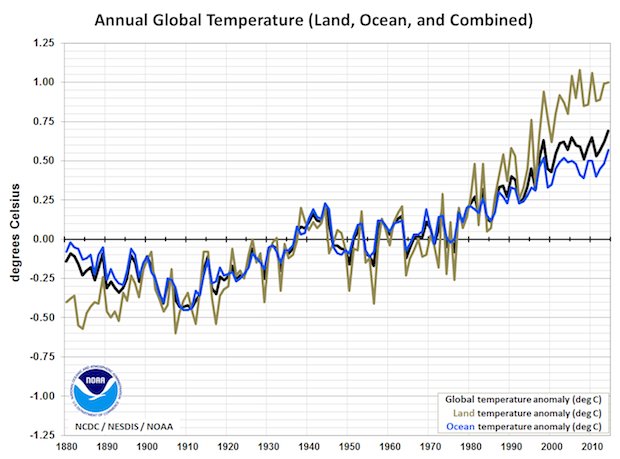2014 proves hottest on record, driven in part by climate change
It's official: 2014 was the hottest year ever.
Two separate analyses by NASA and National Oceanic and Atmospheric Administration found that temperatures across the globe last year were the warmest since 1880. The 10 warmest years, with the exception of 1998, have occurred since 2000.
"This is the latest in a series of warm years, in a series of warm decades," said Gavin Schmidt, director of NASA's Goddard Institute of Space Studies. "While the ranking of individual years can be affected by chaotic weather patterns, the long-term trends are attributable to drivers of climate change that right now are dominated by human emissions of greenhouse gases."
During 2014, the average temperature across global land and ocean surfaces was 1.24 degrees Fahrenheit (0.69 degrees Celsius) above the 20th century average. This was the highest among all 135 years in the 1880-2014 record, surpassing the previous records of 2005 and 2010 by 0.07 degrees F (0.04 degrees C).
Much of the increase was due to warming in global oceans, NOAA said, particulary in the northeastern Pacific Ocean in and around the Gulf of Alaska, much of the western equatorial Pacific, parts of the western North Atlantic and western South Atlantic, and much of the Norwegian and Barents Seas. The annually-averaged temperature for ocean surfaces around the world was 0.57 degrees C (1.03 degrees F) higher than the 20th century average, breaking the previous records of 1998 and 2003 by 0.05 degrees C (0.09 degrees F).
Temperature records on land were also reached across the globe, from far eastern Russia to Australia, across the western United States and much of Europe.
The rising temperatures are part of a long term trend that goes back decades and is driven to a large degree by the burning of coal, oil and gas which traps heats, changing the climate.
Since 1880, Earth's average surface temperature has warmed by about 1.4 degrees F (0.8 degrees C). The majority of that warming has occurred in the past three decades.
The dire temperature news is expected to put further pressure on world leaders to come with an international agreement to combat climate change when they meet in Paris later this year.
The goal of any agreement would be to keep global temperatures from rising more than 2 degrees C over what they were in preindustrial times, which most scientists contend would avert the worst impacts of climate change, such as widespread droughts, heat waves and flooding.
But to achieve that, the world will have to dramatically shift away from its heavy reliance on fossil fuels. To have a 50 percent chance of achieving the temperature goals the world would have to keep 82 percent of coal reserves, half of the gas reserves and a third of oil in the ground.
"The scientific community is telling us that, unless we get our act together, what we will see in years to come is more droughts, more floods, more extreme weather disturbances, increased raising of sea levels which will threaten our coastal communities and in fact countries all over the world," Sen. Bernie Sanders, who plans to introduce an amendment in the Senate affirming that climate change is real, caused by burning of fossil fuels and must be addressed, told CBS News.
"If we don't reverse climate change -- if you can believe this -- by the end of this century, this planet is going to be between 5 degrees Fahrenheit and 10 degrees Fahrenheit warmer," he said. "We know what that is already doing to the ocean and to this planet. What they are saying is this planet is in trouble and it will only get worse unless we move boldly to cut carbon emissions."
It isn't all that surprising that temperatures reached a milestone, since several months in 2014 hit global heat records including December, October, September, August, June and May. April 2014 was the second hottest on record. January, March and July were fourth. February was the 21st warmest.
The United States didn't hit a record in 2014, though it was above the 20th century average for the 18th year in a row. The nation saw stark regional differences over the year: Parts of the Midwest and East Coast were unusually cool, while Alaska and three western states - California, Arizona and Nevada - experienced their warmest year on record, according to NOAA.
